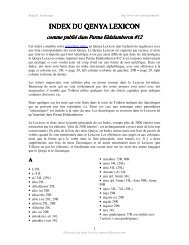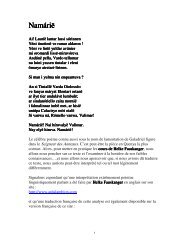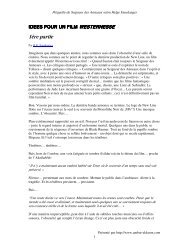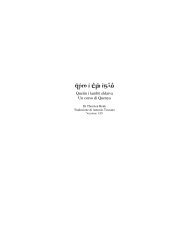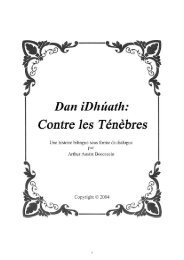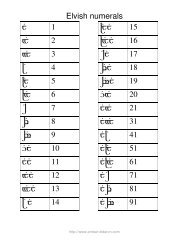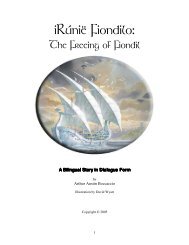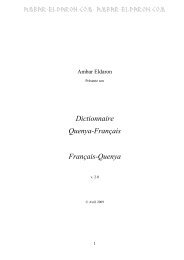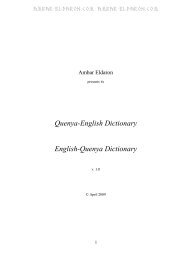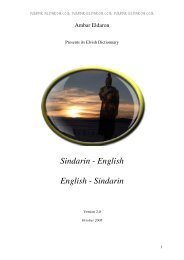Quenya Reverse Wordlist - Ambar Eldaron
Quenya Reverse Wordlist - Ambar Eldaron
Quenya Reverse Wordlist - Ambar Eldaron
You also want an ePaper? Increase the reach of your titles
YUMPU automatically turns print PDFs into web optimized ePapers that Google loves.
Helge K. Fauskanger http://www.uib.no/People/hnohf/<br />
alón nóla ("ñ") (1) "wise, learned" (ÑGOL)<br />
(note that this and the next nóla would be spelt<br />
differently in Tengwar writing, and originally they<br />
were also pronounced differently, since nóla "wise,<br />
learned" was ñóla in First Age <strong>Quenya</strong>).<br />
alón nóla (2) "round head, knoll" (NDOL)<br />
alosto otsola "week" (evidently referring to a<br />
week of seven days like our own, since otso = seven).<br />
(GL:62)<br />
alóyh hyóla "trump" (SD:419)<br />
alumlu ulmula "mumbling" (MC:214; this is<br />
"Qenya")<br />
alúy yúla "ember, smouldering wood"<br />
(YUL)<br />
ám má "hand" (MA3, LT2:339, Narqelion),<br />
dual *mát "a pair of hands" attested with a<br />
pronominal suffix: máryat "his/her (pair of) hands"<br />
(see -rya, -t) (Nam, RGEO:67), pl. allative mannar<br />
"into hands" (FS). Cf. -maitë "-handed".<br />
ama ama not glossed, evidently meaning<br />
"up" like the prefix am- (UNU)<br />
amál láma "ringing sound, echo" (LAM)<br />
amállan nalláma, nallama "echo" (LAM)<br />
amám máma "sheep" (WJ:395)<br />
amar rama- "to shout" (LT1:259)<br />
amár ráma "wing", pl. rámar (RAM, Nam,<br />
RGEO:66, LT2:335); Markirya has both nominative<br />
pl. rámar "wings" and instrumental pl. rámainen<br />
*"with wings" (translated "on wings" by Tolkien);<br />
rámali "wings" in MC:213 would be a partitive pl. in<br />
mature <strong>Quenya</strong>. Variant rámë in the names<br />
Eärrámë, Alquarámë, q.v.<br />
amás sáma "mind" (pl. sámar is given)<br />
(VT39:23)<br />
amét téma "row, series, line" (pl. témar<br />
attested) (TEÑ, Appendix E)<br />
amétamlac calmatéma "k-series", velar<br />
series: the third column of the Tengwar system<br />
(Appendix E)<br />
amétamrap parmatéma "p-series", labials,<br />
the second column of the Tengwar system (Appendix<br />
E).<br />
amétepleyt tyelpetéma "palatal series"<br />
(Appendix E)<br />
amétesseuq quessetéma "qu-series",<br />
velarized series: fourth column of the Tengwar<br />
system (Appendix E)<br />
amétocnit tincotéma "t-series", dental series,<br />
first column of the Tengwar system (Appendix E)<br />
ami -ima adjectival suffix. Sometimes it is<br />
used to derive simple adjectives, like vanima "fair" or<br />
calima "bright"; it can also take on the meaning "able",<br />
as in úquétima "unspeakable" (from quet-<br />
"speak"). Note that the stem-vowel is lengthened in<br />
the derivatives where -ima means "-able"). "X-ima"<br />
7<br />
may mean "apt to X", as in Fírimar "mortals",<br />
literally "those apt to die" (WJ:387)<br />
amiac caima ("k") "bed" (KAY)<br />
amiav vaima "robe" (LT1:271)<br />
amiay yaima "implement" (evidently noun)<br />
(GL:37)<br />
amicúr rúcima ("k") "terrible" (WJ:415)<br />
amilac calima "bright"; see ancalima<br />
amilacna ancalima "most bright, brightest",<br />
sc. calima "bright" with a superlative or intensive<br />
prefix (LotR2:IV ch. 9; see Letters:385 for<br />
translation).<br />
amilem melima "loveable, fair" (MEL);<br />
Melimar a name of the Lindar (in Tolkien's former<br />
conception = the later Vanyar, not the Teleri) (MEL)<br />
amileyt tyelima "final" (KYEL)<br />
amilio oilima "last" (MC:213, 214; this is<br />
"Qenya"), inflected or lengthened form oilimain "last<br />
(pl.)" (MC:221), oilimaisen "(MC:221), oilimaite<br />
"last" (MC:214, 221)<br />
amilis silima the substance the Silmarils<br />
were made of, invented by Fëanor (SA:sil)<br />
amilóf fólima "secretive" (LT2:340;<br />
"Qenya" spelling fôlima)<br />
aminav vanima "beautiful, fair" (BAN,<br />
VT39:14) (glossed "proper, right, fair" in early<br />
"Qenya", LT1:272); nominal pl. vanimar "beautiful<br />
ones", partitive pl. genitive vanimálion, translated "of<br />
beautiful children", but literally meaning *"of [some]<br />
beautiful ones") (LotR3:VI ch. 6, translated in<br />
Letters:308). Arwen vanimalda "Beautiful Arwen",<br />
literally "Arwen your beauty" (see -lda for reference;<br />
changed to Arwen vanimelda in the second edition<br />
of LotR)<br />
amír ríma "edge, hem, border" (RÎ)<br />
amiráynava avanyárima "not to be told or<br />
related" (WJ:370)<br />
amiráynú únyárima "impossible to recount"<br />
(because all the facts are not known, or the tale is to<br />
long) (WJ:370)<br />
amirí írima "lovely, beautiful, desirable"<br />
(ID, FS), in FS also pl. írimar; in the "Qenya" of<br />
Fíriel's Song, adjectives in -a form their plurals in -ar<br />
instead of -ë as in mature <strong>Quenya</strong>.<br />
amiríf fírima "mortal" (PHIR); Fírima pl.<br />
Fírimar "those apt to die", "mortals", an Elvish name<br />
of Mortal Men (WJ:387); fírimoin "for men", a<br />
dative pl. of Fírimor, "mortals, Men", occurring in<br />
Fíriel's Song. Tolkien later changed Fírimor to<br />
Fírimar, so the dative would probably be *fírimain<br />
in mature <strong>Quenya</strong>.<br />
amirim mirima "free" (MIS)<br />
amirís sírima "liquid, flowing" (LT1:265)<br />
amiroc corima ("k") "round" (LT1:257)<br />
amirov vorima "continual, repeated" (BOR),<br />
early "Qenya" gloss "everlasting" (LT1:250)<br />
Presented by http://www.ambar-eldaron.com



